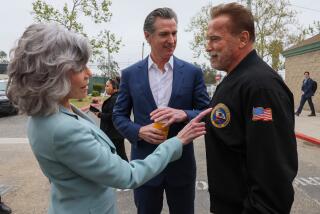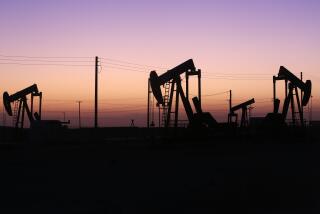Challengers attack Canada’s pro-oil Harper for stalled pipelines
CALGARY, Canada Stephen Harper’s two challengers for prime minister have regularly taken swipes at him during Canada’s election campaign for failing to get oil pipelines built.
Harper, a Conservative who represents a Calgary constituency, is regarded as one of the most petroleum-friendly politicians in Canada. Therein lies the problem, according to his opponents.
How to get pipelines built is a major preoccupation for a Canadian oil industry increasingly worried about getting product to market. The troubled Keystone XL project is just one of four pipeline proposals mired in delay due to concerns over carbon emissions from the oil sands and potential spills.
“He hasn’t got pipelines built. He has made the oil sands an international pariah,” Liberal Leader Justin Trudeau said of Harper during a leaders debate on the economy last week that happened to be held in hard-hit Calgary.
“Under Stephen Harper’s stewardship,” added New Democratic Party Leader Tom Mulcair, “we have not built one kilometer of pipeline to tidewater, and it’s easy to understand why he’s gutted a whole series of environmental laws.”
Harper, who took power in 2006, is standing his ground, saying the oil and gas industry “needs a government that is on its side.”
The debate essentially boils down to this: Would leaders with greener credentials than Harper be better able to break through the resistance to pipelines from environmentalists, community activists, aboriginals and perhaps a certain U.S. president? And how much political capital would each expend?
With Hillary Clinton now adding her voice to Keystone’s detractors, the industry’s focus has turned to moving Alberta oil to tidewater. Two of the proposals, Northern Gateway and Trans Mountain, would transport crude through British Columbia to the Pacific, while Energy East would move it through six provinces to the Atlantic.
None of the leaders has provided a clear answer as to how to get the job done, said Stephen Carter, a political strategist who worked on successful election campaigns for Calgary Mayor Naheed Nenshi and former Alberta Premier Alison Redford. “What we need is political leadership.”
Trudeau and Mulcair, while sharing a similar critique of Harper, differ as to which and how many pipelines merit consideration. Mulcair has explicitly ruled out two of the proposals while saying he will consider Trans Mountain and particularly Energy East, which would create refining jobs in Canada. In the run-up to the election, he emphasized any decision would have to await an overhaul of the environmental approval process and introduction of carbon policies.
Trudeau is open to three of the four, including Keystone. He’s talked up Canada’s history as a commodity exporter, but criticizes Harper for not appreciating “the only way to get energy projects built now is to understand you cannot separate environment and energy.” The one pipeline Trudeau won’t consider is Northern Gateway because he doesn’t think British Columbia’s northern coastline is suitable for tanker traffic.
“If his goal is to appear to be more environmentally sensitive than the Conservatives and more pro-development than the NDP, he’s secured that position on the spectrum,” said pollster Bruce Anderson, chairman of Ottawa-based Abacus Data.
In last week’s debate, Mulcair attacked the Conservative leader for taking a “rip and ship” approach to resource development. He took particular aim at Harper’s lobbying for Keystone, which the New Democrat said would cost Canada 40,000 potential processing jobs.
Harper shot back that Mulcair is the only party leader in the country’s history to go to the U.S. to advocate against a Canadian economic development project. “Mr. Mulcair, when you export your product it creates jobs on both sides of the border,” he said. “That’s why trade is a good thing.”
Trudeau has long criticized Harper for misplaying Keystone by refusing to accompany the proposal with new greenhouse gas regulations and unnecessarily antagonizing President Barack Obama. “With friends like Stephen Harper, Alberta doesn’t need enemies,” the Liberal leader said during the debate.
Mulcair and Trudeau, who are fighting over a large pool of anti-Harper progressive voters in the run-up to the Oct. 19 election, have left themselves plenty of wiggle room with their talk of new environmental requirements. “You see both the NDP and Liberals trying to avoid taking a stance on some of the big pipelines, like Energy East and Trans Mountain in particular, because you could alienate a lot of votes on either side,” said James Coleman, an assistant professor at the University of Calgary’s Haskayne School of Business.
Both face particular political challenges. Mulcair’s support is concentrated in Quebec, where Energy East must traverse the St. Lawrence River and faces its stiffest opposition. As well, left-wing activists in his party have released their own manifesto calling for speeding up elimination of fossil fuels. Trudeau’s party, while highly supportive of oil sands development in the 1990s, remains mistrusted in much of western Canada for the interventionist 1980 National Energy Program brought in by his father, former Prime Minister Pierre Trudeau.
Trudeau has tried to make amends with repeated visits to Calgary in which he has lamented his father’s energy policies for pitting regions against one another. He’s hoping to reverse a trend that has seen his party fail to win a single seat in the energy capital since 1968, three years before he was born.
(With assistance from Josh Wingrove in Ottawa.)
(c)2015 Bloomberg News
Visit Bloomberg News at www.bloomberg.com
Distributed by Tribune Content Agency, LLC.
More to Read
Start your day right
Sign up for Essential California for news, features and recommendations from the L.A. Times and beyond in your inbox six days a week.
You may occasionally receive promotional content from the Los Angeles Times.






